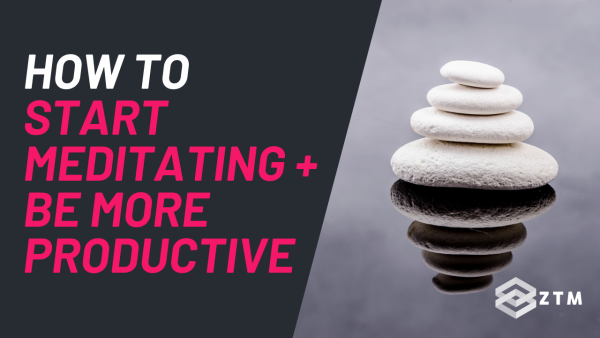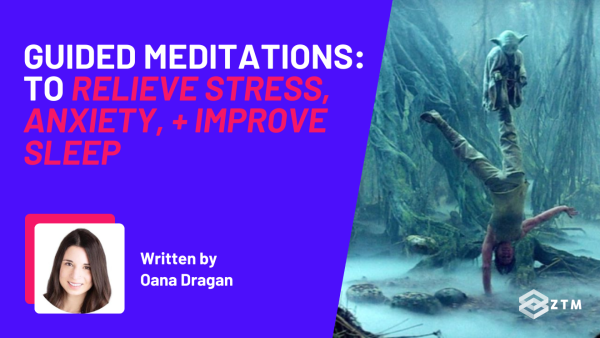This sound familiar?
It’s the week before New Year's, you have some time off, you’re rested, thriving, in your element, and you’re excited about the future.
You grab a notepad or planner, set some goals, and whisper to yourself “This is going to be my year!”
But then you start thinking about last year's goals and the ones the year before that, and they didn’t quite work out as you hoped...
But this year will be different! Right?
The thing is, less than 10% of people actually manage to achieve the goals that they set for themselves at New Year's.
It’s not their fault. It’s just the way we’ve been taught to approach goals is flawed.
Which is why in this article, I’m going to share the 8 biggest things that cause goals to fail, so that you can avoid them, and then achieve your New Year's goal this year - and all future years!
Heck... it'll work for any goals you set, so it's worth learning, even if you're not a resolution type person!
Let’s dive in.
The 8 main reasons why people fail to hit their goals
Reason 1: Vague goals
Some people set goals that are either vague, unactionable or difficult to measure, which means they can’t reach them.
For example
“I want to be better at X topic”.
OK but how much better?
What level are you at now?
How will you measure success?
By not having a clear focus of what they want to actually achieve, the goal just dies off, so be clear on what you want to do.
If you want to lose weight, then how much do you weigh now? What is your goal weight? How will you lose it? How long will it take?
Clarity leads to action and results.
Reason 2: Lack of accountability
Other people fail to hit their goals because they lack any accountability to help them follow through.
In a study by Dominican University on the impact of actions and goal success, they found that people who committed to a goal, and then shared their progress with a friend, had a significantly higher ratio of success.
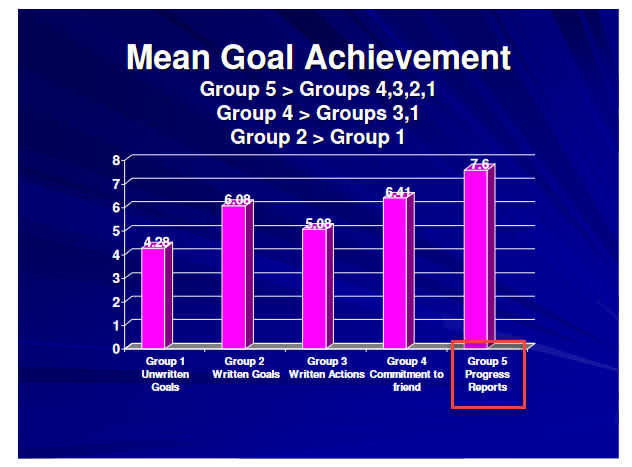
In fact, they measured the success rate of multiple methods of goal completion:
Unwritten goals (just thinking about them)
Writing down those goals
Writing down the steps to take for those goals
Telling a friend about your goals, and
Giving progress reports on your goals
The accountability from having to give progress reports was the highest factor in their test! This is also why we always have accountability partners at Zero To Mastery, as it raises your chance of following through and getting results considerably!
So if you’re setting a goal this year, be sure to tell a friend, and then check in on your progress with them each month.
Reason 3: No path to success
Other people fail at their goals simply because they lack a path to follow. They know what they want to achieve, but have no idea how to get there.
“I want to learn to code”.
Will you create any projects?
The key thing to understand is you need to have a set path of actions to take if you want to get anywhere - just like a roadmap from a to b to c. You can map it out yourself, or 'cheat' and follow the path of someone who has already achieved the same goal that you want.
For example
Here's our career path to become a Fullstack -Web Developer:
Become a Fullstack Web Developer
13 milestones 9 courses
Step-by-step roadmap where you'll learn to code and build a portfolio.
Curated curriculum of courses, workshops, challenges, projects, and action items.
Become a Fullstack Web Developer from scratch and actually get hired.
Earn on average per year:
$115,887
US salary data collected from Indeed, LinkedIn, and Web3.career 2026.
You simply follow along and learn the right things, in order. The teacher has mapped it out in terms of what you need to know and when, so that you can go from zero skills to being able to be hired.
As you can imagine, this is a HUGE time saver but it also makes it so much more likely that you'll follow through and not get lost or get stuck second guessing yourself.
Reason 4: A lack of focus
Life can be distracting and it can be hard to focus.
That’s why I recommend that people learn to meditate. It’s one of the key contributing habits of high performers across multiple industries.
It helps with focus, clarity, and resilience, and resets the brain. You’re not only more efficient when you’re on a task, but you can stay on it for longer also.
No more 2 minutes of work and then 20 minutes of TikTok! Instead it's like a super power for getting stuff done.
Or watch the first videos for free. Anyways, back to the guide.
These 4 issues are often obvious once you spend any time trying to achieve a goal. However, these next 4 issues are often missed by people - even those with some success, and can cause recurring failures.
Reason 5: Setting the wrong goals
Many people fail at goals because they lack the motivation.
They have it at first but it dips. Sure, you can add in systems and processes to keep momentum after the motivation fades which will definitely help.
But you have to ask yourself: "Why was the motivation there in the first place, and why isn’t it there anymore?"
Often it’s because it’s not really a goal you care about. Rather, it’s a goal you just think you should care about.
For example
Maybe you love the idea of becoming a product designer so you can lean into your creative side. But then you see everyone talking about AI and LLM's, so you think you should try and become an AI Engineer instead.
Trust your gut and do the research!
If the market for product designers was dying out (which it isn't) then sure, it might be a good idea to choose something else. But in this case, just because another industry is the latest hype and other people are telling you that's what you should do, it doesn't mean you should immediately just jump to that.
You're much more likely to stick to learning something and reaching your goals if you have a genuine interest and curiosity in it.

Trust me on this.
It's not your fault that you might second guess your decision either. As humans our need to be loved and accepted by others quite often drives our goalposts, but it's a poor North Star.
When we were young we were dependent on those around us for our very survival. It‘s so deeply ingrained within us, that we go to great lengths to ensure that other people like us.
Often we trade in our deepest yearnings for outside approval from those who typically mean us well. Sure it isn’t wrong in and of itself to make those around us happy. But at what cost to ourselves?
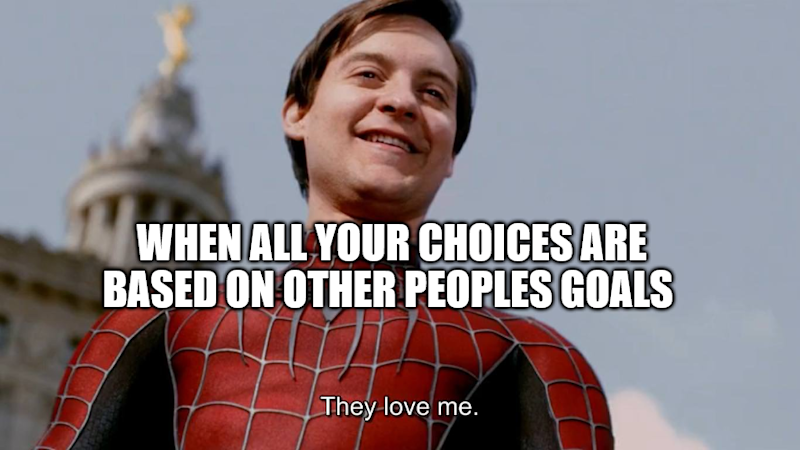
If you follow the path of gaining approval as opposed to the one of staying true to your heart, you’ll end up lost and mostly unfulfilled.
If you really want to make a change in your life, you need a deeper connection to the reason behind that change or goal. As they say, it’s better to be a failure at something you love, than a success at something you hate.
It may not seem like much, but when it comes to making life changes and achieving hard, long-term goals, it comes down to the difference between “I should do this” and “I choose to do this”.
One of those statements is incredibly powerful, while the other is a task on a list. It suddenly feels like ownership of your future and clarity on why you’re doing the thing.
TL;DR: If you want to hit your goals, then you need to be clear on the reason why.
Why do I want this?
Is it for me, or am I fulfilling someone else's dream?
If it is for me, am I doing this for the right reasons? Am I clear on the actual motivation? The thing that will keep me going when times are hard? (Maybe ‘more money’ is the original goal, but in reality, financial and time freedom is the real motivation)
Whatever your goal is, choose to do it for you, and align the reasons with your own needs. You’ll find that your follow-through and commitment will last far longer this way.
Reason 6: Relying on motivation alone
I hinted at this in the last step, but motivation (even for something you really want), will only get you so far.
You need systems, processes, and a roadmap if you want to succeed.
Without a plan or roadmap for how to reach your goal, you won't know where to start and will be stuck in analysis paralysis
Without systems, you'll just do any old action - possibly working on the wrong things, or missing what's important
And without a process, you're actions will be inefficient and far more difficult
Make your life easier and implement these things, and you can achieve almost anything. The motivation can fade, and you can be tired, but you'll move forward until you hit that goal.
Often these systems are what separates success and failure.
Reason 7. Mental roadblocks
Subconscious beliefs. We all have them. Thoughts and feelings that exist in the mind and influence our behavior without our knowing.
Usually caused by experiences in childhood, we don’t realize we have them, and how much they hinder us.
Money
Money is a major one. You learn most about money from your parents. If they struggled when you grew up, then you’ll often struggle too. Simply because of your experience and relationship with it.
Even when you succeed and get a high-paid job, you can self-sabotage from a subconscious belief that you’re not worthy of it.
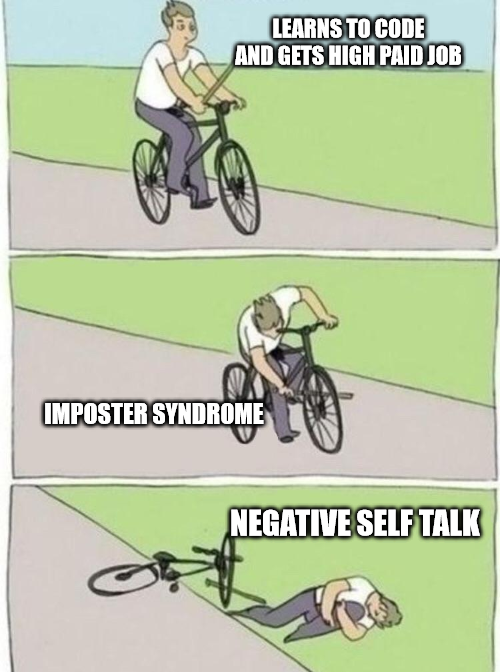
Perfectionism
Another impediment could be that you strive more for perfection than you do progress.
“I’ll start a YouTube channel once I have the perfect lights, and camera set up, and know everything about editing”.
It’s the fear of failure and wanting everything to be perfect that stops us. Maybe as kids we were told not to make mistakes, and so we struggle to move forward.
Negative self-talk
Another of the biggest innate beliefs that hold a great majority of people back is that they don’t feel worthy of their dreams.
For example
Let’s say you want to get a job at Google, but deep down inside you don’t feel you’re not good enough for it. Why would you get the position over everyone else who is, in your limiting perspective, more intelligent, confident, and savvy than you?
This type of thinking can lead you to stop in your tracks before you even get started, or ruin your chances in an interview because of your lack of confidence.
Ultimately, you create what you believe you can have, so removing these mental roadblocks is the key to succeeding. And until we bring them to the forefront and integrate them, they may keep us from what we set out to accomplish.
Reason 8: Unhappy with your progress
Technically, this is still a subconscious issue, and it seems counterintuitive but I want to bring it up.
Some people will fail because they’re unhappy with their level of success.
For example
They work hard, know all the tips here, and are achieving their goals. However, they’re not achieving them as fast as they would like, and are constantly measuring their performance today, based on where they want to be, and not where they’ve come from.
This negative and judgmental thinking towards yourself can jeopardize your progress altogether. You give up because you’re ‘a failure’ when in reality, you’re 50% better than before.
Life is a journey. It’s not about “getting there”, because quite frankly, you’ll never get there. This mentality will mean that even when you arrive where you think you want to be, (and it’s a goal you actually want), you’ll still feel unfulfilled.
Some tips to get past this:
Learn to embrace your deeply ingrained need for expansion!
Practice daily gratitude for where you are now, where you were before, and what you’ve achieved
Celebrate the small wins, and
Keep your mind calm
Get started on achieving your goals today!
Hopefully, these tips have triggered some aha moments in you, and you can see where these issues have been coming up in the past.
Knowing them and having a plan to get past them is the first step to success. After that, it’s simply a matter of taking action and working towards your dreams.
This is your year.
Get clear on your reason why
Write those goals
Map out your roadmap (or follow someone who has done what you want to do)
Make yourself accountable. Tell your friends and have them check in with your progress
You will struggle, so be sure to keep a handle on your mental health. This meditation here will help with this
Measure your results and celebrate how far you’ve come
You’ve got this, and I can’t wait to see what you achieve 😀.
Best articles. Best resources. Only for ZTM subscribers.
If you enjoyed this post and want to get more like it in the future, subscribe below. By joining the ZTM community of over 100,000 developers you’ll receive Web Developer Monthly (the fastest growing monthly newsletter for developers) and other exclusive ZTM posts, opportunities and offers.
No spam ever, unsubscribe anytime

![Learning to Meditate [Productivity & Focus]](https://images.ctfassets.net/aq13lwl6616q/2a7NI2zgRFphCk8pnDHBYF/34433f9991c8952427f112d428014bc6/Meditation_Thumbnail_2-_Academy.png?w=600&h=335&q=50&fm=png&bg=transparent)

